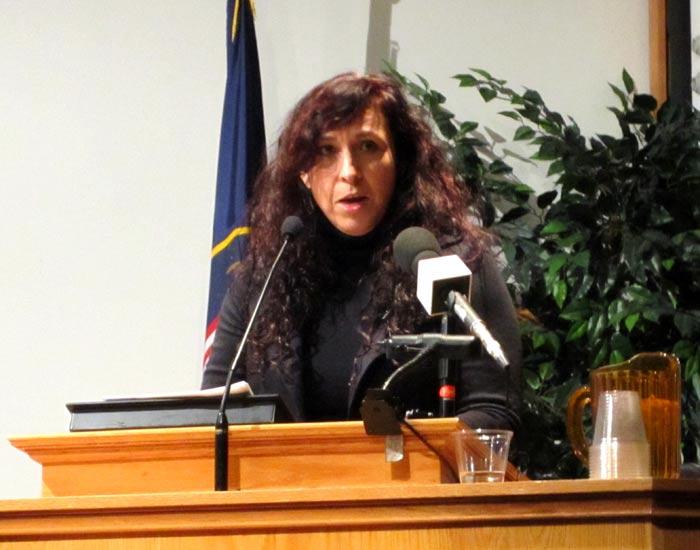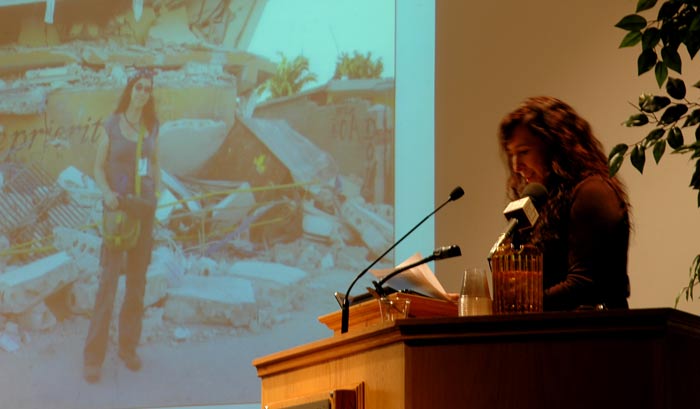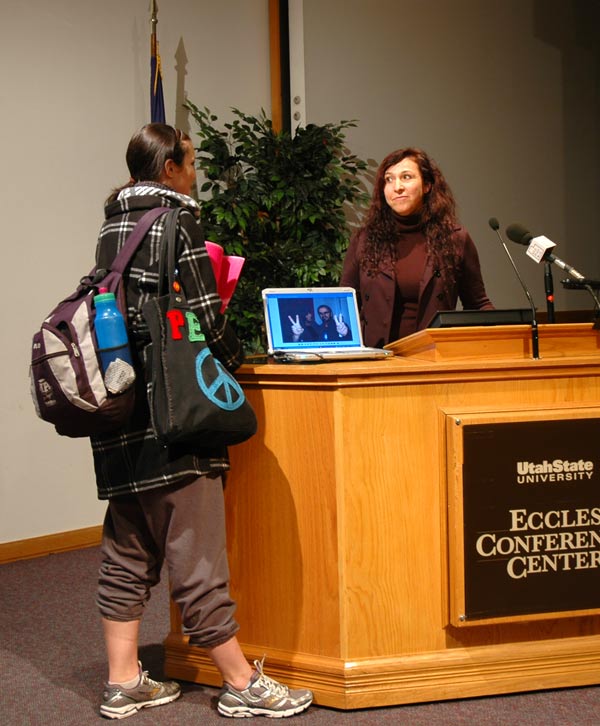From Haiti to Hollywood, NPR reporter covers the world
February 18th, 2011 Posted in Arts and LifeStory & Photo by Shirrel Cooper
LOGAN—She has traveled the world, survived earthquakes, hurricanes and fires, reported the news in her underwear, had guns pointed at her as she tried to cross borders, and spent time on Hollywood’s red carpet, schmoozing celebrities.
For Mandalit del Barco, it is all in a day’s work.
“As a journalist I have been in some rather risky places,” del Barco said. “It’s all just a big adventure for me. I have a lot of fun.”
• Hear Utah Public Radio interview with Mandalit del Barco
 Del Barco is a general assignment correspondent for National Public Radio based in Los Angeles. She was in Logan as a guest of Utah Public radio and the USU Morris Media & Society Lecture Series, sponsored by the Department of Journalism & Communication, with support from the USU Provost’s Office.
Del Barco is a general assignment correspondent for National Public Radio based in Los Angeles. She was in Logan as a guest of Utah Public radio and the USU Morris Media & Society Lecture Series, sponsored by the Department of Journalism & Communication, with support from the USU Provost’s Office.
A fourth-generation journalist who has been working in the industry for 31 years, del Barco said she’s worked hard since the age of 18 to be in her current position.
“I have been able to earn my stripes to be able to do these fun things,” del Barco said. “Sometimes it takes time, sometimes you just get lucky, and everybody has a different experience.”
Del Barco’s experiences have covered multiple continents. She talked about some of those Thursday before an audience of about 250 at the Eccles Conference Center. Through her work she has met with fascinating people and reported on history-making experiences around the world, she said.
“It was a dream assignment I kind of dreamed up for myself, to get myself a trip to Argentina, with dancing experts, with tango experts, and I learned to dance the tango,” del Barco said. “In China, I met with a bunch of women activists from around the world. In Puerto Rico, I met with people whose family members had been killed in Iraq.” She was also able to travel to the Philippines, Peru, and Mexico.
“I had my own year of living dangerously, running through the streets during protests with tear gas,” she said. While working with NPR’s Scott Simon, she was able to travel with a group of immigrants as they tried to cross the border.
“We trudged through the nastiest sewer in North America,” Del Barco said, “and literally (got) rounded up by the border police. An officer was actually pointing his gun at me and yelling at me to stop and turn around and come back. I signaled to the engineer to keep rolling the tape, so he would capture the experience.”
Del Barco’s presentation, entitled “Haiti, Hemp, and Hollywood: Stories of our times” focused more specifically on her recent experiences as a journalist—covering the devastating earthquake in Haiti, California’s failed campaign to legalize marijuana, and her work covering award ceremonies in Hollywood.
Del Barco was in Port-au-Prince, Haiti’s capital, as aftershocks from the 2010 earthquake brought down buildings around her.
“All the buildings and homes were completely collapsed, and thousands of people had died, hundreds of thousands of people,” del Barco said. “It’s really amazing to see when you’re actually in the place, and driving along, and seeing the destruction. … Haiti was completely devastated.”
Del Barco took messages from a fifth grade class in California to the children in Haiti. These messages gave love and encouragement to the children a world away.
“I just think those kids were amazing,” del Barco said. “They wanted to see if I could give them the letters, and so I did. I thought they were really eloquent in what they said.”
While in Haiti, del Barco had to live in an earthquake-torn hotel.
“It was kind of crazy because we were staying in a hotel that the entire lobby had collapsed, and there were cracks in every single wall of every room,” she said. “At one point, there were all these aftershocks, so many aftershocks that finally I just decided I was going to sleep outside the rest of the time because I had seen too much of what had gone on.”
Another experience del Barco discussed was her coverage of last year’s marijuana debate in California. Proposition 19, the bill that would have legalized marijuana for more than just medicinal purposes, featured strong opinions from both sides of the issue.
“The stoners and the growers were against legalizing marijuana,” del Barco said, “but there was a group of mothers that I met that were campaigning for legalization, because they said it would mean that the sales would be more regulated and controlled,”
Del Barco spent time in Humboldt County, Calif., to research the story, traveling by helicopter with sheriff’s deputies into remote parts of Humboldt Redwood National Park to see where illegal marijuana was being grown. Even some of the law officers she interviewed favored legalizing the drug.
 “Even police officers that I interviewed were in favor of legalization,” del Barco said, “because then they could concentrate on more violent crimes.”
“Even police officers that I interviewed were in favor of legalization,” del Barco said, “because then they could concentrate on more violent crimes.”
Because del Barco lives in Southern California, she often covers stories that take place near her home.
“It seems like whenever there’s a police report of a gunman loose in Los Angeles, I seem to get the assignment,” del Barco said. “There’s an armed suspect running through people’s backyards, being chased by a SWAT team? Get over there, my editor will say. Or a high school kid with a gun in class … that’s my cue to get over there.
“It’s enough to make me feel a little expendable,” she said.
Del Barco said she remembers waking up in Los Angeles to a 6.7 earthquake. She called the news desk in Washington, D.C., to inform them and they assigned her to cover the story.
“They immediately put me on the air live for six minutes, which is a very long time on radio when you don’t have that much information to give,” del Barco said. “So there I was, in my bedroom doorway, in my underwear, trying to answer questions from the host, like, ‘What are the freeways like?’ and, ‘Is the power down?’”
Living in California also gives del Barco the chance to cover the Hollywood award shows every year.
“It’s fun,” del Barco said. “It’s a lot different from going to Haiti.” Like all the journalists covering the award shows, del Barco has to dress up. She said that it’s difficult to juggle all of the equipment while wearing a gown, but she still enjoys the experience.
“I have gotten to do this the last 10 years, both assignments [the Grammies and the Oscars], and I really enjoy it,” she said. “For some reason, the other reporters don’t want to do this.
“It’s kind of the opposite end of covering gang wars,” she said.
Students at Utah State were fascinated by del Barco’s experiences.
Noelle Johannsen, a sophomore journalism major, said she likes that del Barco said she prefers features to hard news.
“I worry that I am not hard-news enough,” she said. As a print journalist, Johannsen said that she figures she could incorporate some aspects of del Barco’s radio reporting into her stories.
“I actually never considered radio before,” she said. “Her talking about her life and her experiences makes it sound really appealing.”
Political science major Michael Rushton said he thinks it is really cool that del Barco gets to travel around the world for her job.
“I think it’s amazing. I think what she does is fantastic,” he said. “She gets to (travel) and have fun. I feel like that would be a fun job to do.”
Colton Thompson, a sophomore broadcast journalism major, said that he is interested in the things that del Barco talked about and wants to know more.
“It seemed like an interesting thing,” he said. “I liked a lot of her stories. It seems like she has a fun life and a fun job.” Del Barco’s presentation piqued his interest in NPR.
“I definitely would look into it,” Thompson said, “to see what sort of things they do and what they cover.”
Del Barco said she loves her job and that she is grateful that NPR and their style of longer-form radio reports still exists.
“I feel really lucky that NPR’s still around to provide these kinds of stories,” del Barco said. “At a time when other places have cut back with international reporting and cut back on their reporters or engineers, we still are going.”
Del Barco said that of all the stories she presented, she does not have a favorite.
“It’s like they’re all my babies,” del Barco said. “I just love them all, in different ways.”
TP
Tags: Haiti, hemp, Hollywood, Mandalit del Barco, Morris Media & Society Lecture, NPR


Sorry, comments for this entry are closed at this time.